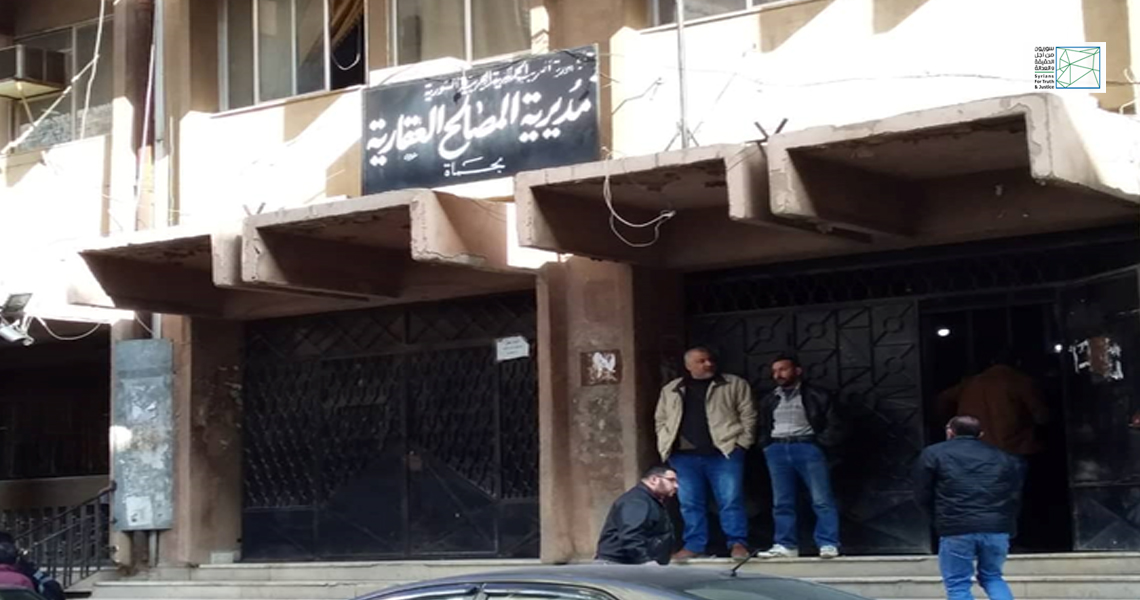In Hama city, no less than 25 estates were confiscated, “attached or prevented from being disposed of, [while violators are] to be held accountable” by Syrian security services or persons who have a direct connection with the Syrian government and its affiliated security branches. The confiscated estates belong to opposition figures who left the city for security-related reasons. The same services have imposed restraints on all real estate transactions in the city, as they demand a security clearance before pursuing any transaction.
The field researcher of Syrians for Truth and Justice/STJ in Hama city met and contacted an expeditor, an owner of a real estate office and three persons whose properties have been confiscated, who are all based in the city. The researcher also communicated with two persons from the city, who left it more than four years ago and whose estates have been seized.
-
Briefing on the Status of Real Estate and Related Resolutions Passed:
On August 12, 2015, the Syrian Government/Damascus-affiliated Ministry of Local Administration issued a confidential circular, numbered /463/W/, stating that all real estate transactions of sale or conveyance/transfer of ownership, including shops and houses, in regulated and unregulated areas require an in advance security clearance. Based on this circular, the Ministry of Justice/Damascus has passed a resolution numbered 689/W/ on October 12, 2017, stipulating that persons wishing to grant internal or external power of attorney to individuals, companies or commercial agencies or to certify them should obtain a security clearance as well, including powers granted outside Syria. On May 21, 2018, the same ministry issued a circular, holding the number /351/W/, which necessitated that both the seller and the buyer, participating in a public auction, get a security clearance.
All real estate-based transactions have been restricted and suspended awaiting the outcome of the security assessment conducted by four security services: The Air Force Intelligence Security Service, Military Intelligence Department/ Military Security, General Intelligence Directorate/State Security and the Political Security Department/Political Security, which cover both the seller and the buyer – two sides to a transaction- as reported by people working in the real estate field.
Several of these people explained to STJ’s field researcher that the Political Security Department is basically the one conducting the “security assessments” and contacting the three other services listed above. It, then, files the outcome of the assessment, approval or disapproval, to the Directorate General of Real Estate Interests or one of the services, which has an “interest” in foreclosing/attaching the property addressed by the assessment.
Commenting on this, a civilian, who works as a real estate broker, said:
“The circular, on the outside, aims to combat the forgery of real estate transactions, especially those addressing the estates belonging to people displaced from the city. It also sought the prevention of the sell processes, which were suspected as being a source for securing money for or funding terrorism. However, the truth is that this resolution has turned into a tool, facilitating for the seizure of houses, belonging to anti-government persons, others who escaped the city fearing prosecution, in addition to the missing or the dead, whose death was not officially recorded at the Civil Registry Departments, while none of their relatives stayed at the city.”
Eyewitnesses and people working in the field of real estate, who have been interviewed for this report, said that houses were seized or attached by the Political Security Branch following a security assessment of 3 to 6 months, covering the target property, the buyer and the seller. The outcome of the security assessment is then delivered to the Real Estate Registry by the Political Security Department in the form of a confidential letter, shown to neither the buyer nor the seller; only the expeditor is contacted in this case, where he is informed of the approval, thus, allowed to carry on with the transaction he is brokering, or of rejection, which means that the property cannot be dealt with in any term. The Political Security Department, for its part, attaches it and uses it the way it wants. For example, it might grant it to people working for the security branches or others known for their loyalty to the Syrian government or for having connections with the security branches, as to live there or preserve it the way it is, frozen according to a security order, which has neither legal nor judicial justification.
According to several brokers, met by STJ’s field researcher, there is not a specific criterion according to which the Political Security Department would approve or disapprove pursuing the transaction of ownership transference from one citizen to another, for the cases in which the outcome was a disapproval on the part of the Department is always attributed to “security reasons,” which are never clarified. In addition to this, the witnesses who expedite transactions on a regular basis at the Real Estate Registry have all confirmed that “a state of moodiness governs these decisions, for there were a few transactions, one side to which was being prosecuted or wanted, and the outcome [of the security assessment surprisingly] came as an approval.”
On the same note, Jamal J., an owner of a real estate office in the city of Hama, said that he came by eight decisions disapproving the sell and purchase operations that were being conducted through his office. He added:
“Our work suffered a lot after the imposition of the security clearance/approval, for both the sale and the purchase processes started to demand a long time, no less than three months at best. And worse still, the security services now have a justification to take possession of people’s belongings and deal with them the way that suits them the best, with no one to stop them. I, myself, have been met with eight disapprovals, after some of which the security services have seized the property concerned and housed connections; others, nonetheless, are frozen, and their owners are not entitled to any transactions involving them.”
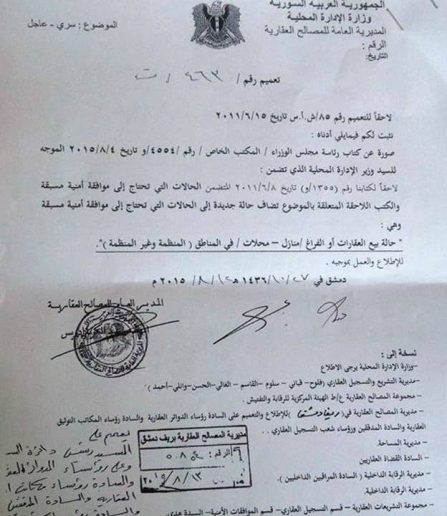
The circular issued by the Ministry of Local Administration, which stipulates obtaining a security clearance in advance of any real estate-based transaction. Photo credit: Al-Hayat Newspaper citing Reuters[1].
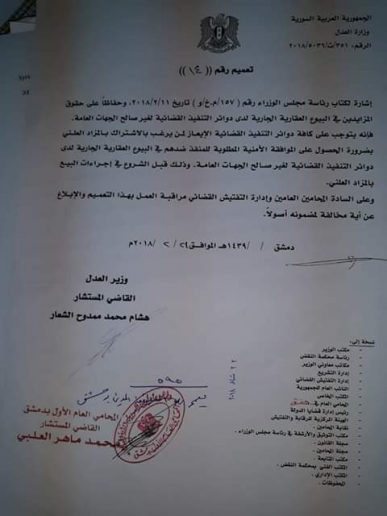
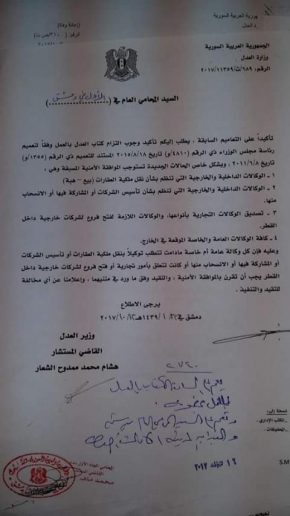
The two circulars issued by the Ministry of Justice, providing for the security clearance being a precondition for pursuing a transaction or granting a power of attorney.
-
Confiscation of Properties following the Security Assessment:
Mr. Khalid M. recounted to STJ the details of the confiscation of his brother’s house by the Political Security Service, which is located in the Tall al-Dabaghah, after he tried to pursue a sale transaction of the house under an official power of attorney he is granted by his Lebanon-based brother.
Khalid said:
“My brother sent me an official power of attorney to sell his house in Tall al-Dabagha, which enjoys both a vital and an exquisite location. Based on the power I am granted, I offered the house for sale at a real estate office in the area. A buyer showed interest, and we agreed to make the sale. We then started pursuing the routine transaction of sale and ownership transfer at the Real Estate Department. The employee there asked us to wait for a call. The official letter reporting the outcome of the security assessment arrived, and the employee called me after a wait of six months and a few days. He told me that [we got] a disapproval, and that the sale transaction could not be pursued any further. I referred to the Real Property Registry and asked the employee to see the disapproval myself, he told me that it was confidential and only employees were entitled to view it. I also attempted to know the reasons for the disapproval, but the employee informed that it was none of his business and that I had to refer to the Political Security Department to demand answers.”
About a month after Khalid received the disapproval preventing him from finalizing the sale transaction, a patrol consisting of Military Security’s personnel appeared at the real estate office which was expediting the transaction. They asked for the house’s detailed address and headed there. They blew the lock off and invaded the house. Later on, a Syrian government-affiliated officer, from Idlib province, started living there.
Khalid reported what he went through:
“Hearing that certain persons have entered my brother’s house, I went there and demanded that they introduce themselves. The person introduced himself as an officer at the Military Security Branch, originally from Idlib, and that he came to live in the house because its owner is a wanted person, and that he, [the officer], is worthy of living [in the house] because the gunmen/opposition factions have taken hold of his house in Idlib. He also told me that I am better to not return here, as to save myself the bother.”
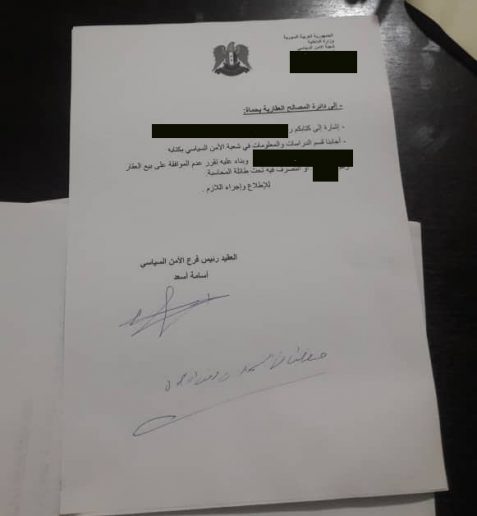
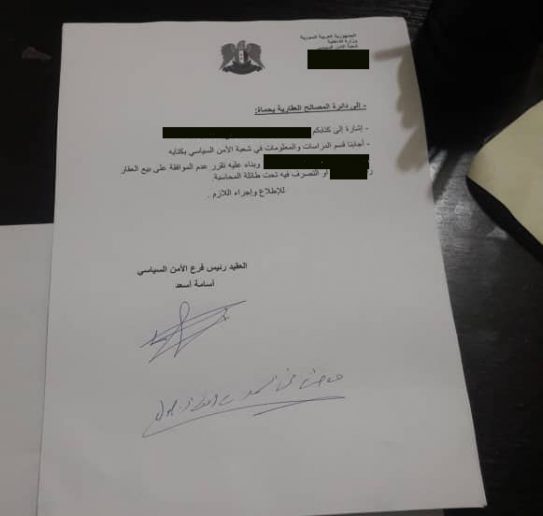
An official letter reporting disapproval, sent by the Political Security Department to the Directorate General of Real Estate Interests in Hama city. Photo credit: STJ.
In another incident, Mrs. Iman M. told STJ’s field researcher that personnel of the Military Security Department have confiscated her house on the al-Sharia Street, Hama city after she tried to sell it through granting authority to a lawyer, since she has moved to Jordan with all her family members seven years ago. She said:
“I granted a lawyer the authority to sell my house as to use its money while away from homeland. In addition to the fact that our return does not seem to be that soon. However, the lawyer told me that I could not make a sale due to a security-based refusal. He also advised me to rent the house to people I trust without a contract, for contracts also demand a security clearance, saying that it would be better than leaving it forsaken for others to come and live in it. Only two months later, my neighbors informed me that a family is living in the house. Asking about it, we came to know that the family cooperates with the Military Security. The lawyer filed a complaint to the al-Sharia Neighborhood’s Police Station, where they told him to refer to the Military Security. Afraid, he refrained from going there.”
STJ’s field researcher reported that, in Hama city, no less than 25 estates, houses and buildings, were seized in the past three years by the security services operating in the city. All these properties belong to persons prosecuted or wanted for security reasons. The majority of these estates are located in the neighborhoods of al-Qusour, Tall al-Dabaghah, al-Sharia, Tariq Halap, al-Arbaeen and al-Ta’awuniyah, and most of the confiscations aimed at housing security officers at houses forsaken by their owners, security branches- affiliated armed groups’ commanders, persons linked to security branches or those cooperating with them, as well as the internally displaced persons who came to Hama city while having connections with the security branches or working for them.
-
Estates Seized by Persons Subservient to Security Branches:
Mohammad al-Samman, from Hama city, who sought refuge in Turkey seven years ago, told STJ’s field researcher that persons with strong ties to the Air Force Intelligence Service seized his house in the Majra al-Ziyadeh in Hama city, and he has been living there since 2016. Mohammad said:
“The person who seized my house is on strong terms with officers of the Air Force Intelligence Service; he knew me personally before I left Hama, being prosecuted by the security forces. He has been living in my house for about two years. I have repeatedly offered him money in return for leaving my house. But he refused and told me, ‘summon the security forces to get me out.’ He is sure that I cannot do this because the forces are having his back not mine. I have been recently informed that he forged a title deed to register the house in his name.”
In a similar incident, Fouad K., a resident of the al-Arbaeen Neighborhood in Hama city, told STJ’s field researcher that people internally displaced from Idlib and Raqqa provinces have seized 10 empty residential apartments in the neighborhood, helped by none but the Military Security Branch. He said:
“There are many vacant apartments in the neighborhood, abandoned by owners who chose to live abroad with their wives and children. About 10 apartments are housed by displaced persons who have connections with the security forces, without getting the permission of the owners or even informing them that they are living there. One of these apartments belongs to my neighbor; no one dares to ask them out because they summon the security immediately.”
Fawaz H., a resident of the al-Ta’auniyah Neighborhood, Hama city, recounted that his house is located near a building which has been completely seized by a commander of an armed group affiliated with the Air Force Intelligence Service in the city. He brought his family to live there and allocated the first floor to his personnel, who guard the building. He said:
“More than four years ago, this commander, a gunman very well-known in the city, seized a privately owned three-store building, after its owners trusted him with it and traveled to Saudi Arabia because they were being prosecuted by the security forces. The commander claims that he has bought the building. However, I contacted the owners, and they refuted selling it. Only people close to the commander are allowed in the building, for there are guards at its entrance. The neighbors cannot even park their cars near the building, prevented by the guards.”
STJ’s Legal Consultant Explained the Following:
“The three circulars, mentioned and attached above, which restrict owners’ usage of their discretion in dealing with their properties, stipulating that they obtain a security clearance, are all a violation of the Syrian constitution, which granted the Syrian citizen the right to addressing his/her privately owned property, using, benefiting by and dealing with it, with all the freedom bestowed on an owner.”
These circulars, the legal consultant stressed, have deprived numerous people of transferring the ownership of their estates for failure to get the security clearance; they have also robbed some judicial rulings of their powers and delayed the enforcement of others although the judicial authority is supposedly independent. The final judicial sentences, for their part, must be put into force, being the acquired right of the persons in the interest of whom they fall. This matter is a violation on the part of the executive authority of the judicial authority, which confirms the lack of separation of powers among authorities that the Constitution provides for.
She added:
“The fact that no clear or overt criteria are set up as to frame the security assessment or clearance, subject them to the moodiness of the security services, backed by no legal justification, for when the security assessment ends with disapproval without mentioning a clear and an open reason, with regard to the status of the person pursuing a real estate transaction, let him/her be requested to refer to so-and-so security side, supposed to join mandatory or reserve military service, or being based in areas held by the opposition, are all reasons lacking the ground of the laws duly concluded.”
The legal consultant noted that the precondition of obtaining a security clearance for the finalization of a lease contract at the Property Unit has been canceled, according to circular No. 2744 of 2018, which provides for canceling the in advance security clearance and ratifies that the eligibility of a lease contract is not based on the outcome of the security assessment.
STJ’s field researchers in Rif Dimashq and Homs provinces have monitored the seizure of properties belonging to anti-Syrian government persons, in cases similar to the ones mentioned above, where using the security clearance, recently modified resolutions related to the workings of the Real Property Registries, restrictions imposed on establishing title to or transferring the ownership of an estate, as well as imposing a cautionary seizure on the possessions of people based in areas outside the control of the Syrian government seems to be a systematic approach to confiscate properties of opposition figures.[2]
———————————
[1] “Syrian Regime Stipulates a Security Clearance for Selling Real Estate”, Al-Hayat Newspaper. August 20, 2015. Last visited: July 24, 2019.
[2] “Syria: Arbitrary Resolutions Provide for Cautionary Seizure of Opposition Figures’ Properties”, STJ. March 6, 2019. Last visited: July 24, 2019. https://stj-sy.org/ar/view/1211.
“Rural Damascus: Civilians Arrested and Prevented from Returning Home”, STJ. March 11, 2019. Last visited: July 24, 2019. https://stj-sy.org/ar/view/1219.
“Eastern Ghouta: Challenges Faced by People Trying to Establish Title to Properties”, STJ. March 7, 2019. Last visited: July 24, 2019. https://stj-sy.org/ar/view/1215.

